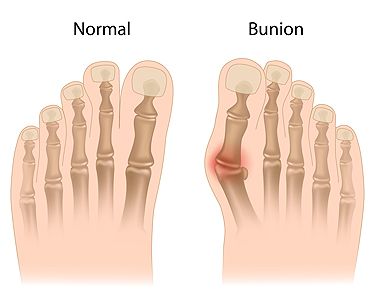
A bunion is a bony bump that forms at the base of the big toe, resulting from misalignment of the joint. It can cause pain, swelling, and difficulty in finding comfortable footwear. Genetics, wearing tight or ill-fitting shoes, and certain foot shapes can contribute to bunion development. To prevent bunions, it is important to wear shoes with a wide toe box and avoid high heels that put pressure on the front of the foot. Custom orthotics can provide support and alleviate pressure on the big toe joint. Stretching and strengthening exercises for the feet can improve alignment and reduce strain. Early intervention, such as using bunion pads and maintaining a healthy weight, can also help prevent the progression of bunions. If you have a bunion, it is suggested that you speak to a podiatrist who can provide you with additional methods for relief and treatment options.
If you are suffering from bunions, contact Richard Galperin, DPM of Texas. Our doctor can provide the care you need to keep you pain-free and on your feet.
What Is a Bunion?
A bunion is formed of swollen tissue or an enlargement of boney growth, usually located at the base joint of the toe that connects to the foot. The swelling occurs due to the bones in the big toe shifting inward, which impacts the other toes of the foot. This causes the area around the base of the big toe to become inflamed and painful.
Why Do Bunions Form?
Genetics – Susceptibility to bunions are often hereditary
Stress on the feet – Poorly fitted and uncomfortable footwear that places stress on feet, such as heels, can worsen existing bunions
How Are Bunions Diagnosed?
Doctors often perform two tests – blood tests and x-rays – when trying to diagnose bunions, especially in the early stages of development. Blood tests help determine if the foot pain is being caused by something else, such as arthritis, while x-rays provide a clear picture of your bone structure to your doctor.
How Are Bunions Treated?
- Refrain from wearing heels or similar shoes that cause discomfort
- Select wider shoes that can provide more comfort and reduce pain
- Anti-inflammatory and pain management drugs
- Orthotics or foot inserts
- Surgery
If you have any questions, please feel free to contact our office located in Dallas, TX . We offer the newest diagnostic and treatment technologies for all your foot care needs.
